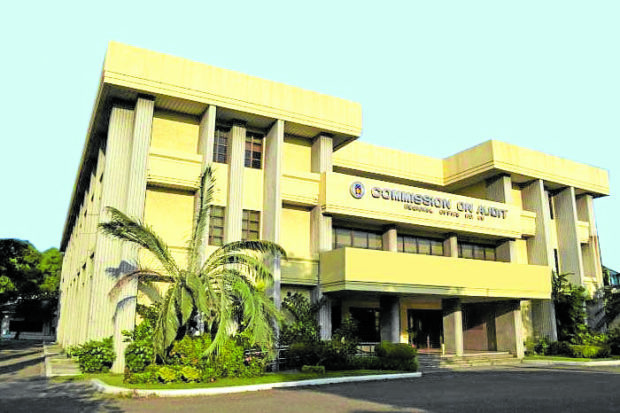COA raps 21 Cebu towns for P38-M COVID aid to ‘ineligible’ recipients

RETURN THE MONEY The Commission on Audit in Central Visayas goes after “ineligible” beneficiaries of the government’s social amelioration programin Cebu and asks concerned local governments to send demand letters to the beneficiaries for them to return theCOVID-19 aid. — PHOTO COURTESY OF COA-7
CEBU CITY—The Commission on Audit (COA) has called the attention of 21 towns in Cebu that released a total of P38.79 million of COVID-19 cash aid to over 6,000 “ineligible” persons, including some village officials.
In its annual report, a copy of which was obtained by the Inquirer over the weekend, the COA asked the 21 local government units (LGUs) to issue demand letters to these “ineligible” beneficiaries who must return the money.
State auditors also wanted the concerned officials to explain and submit a justification on the inclusion of ineligible beneficiaries in the distribution of the social amelioration program (SAP), funded under the Bayanihan to Heal as One Act, which was the first tranche of cash aid released between April to May last year to families hit hard by the coronavirus pandemic.
Named in the COA report were the towns of Alcantara, Bantayan, Boljoon, Badian, Borbon, Daanbantayan, Catmon, Malabuyoc, Medellin, Oslob, Moalboal, Poro, Samboan, Ronda, San Francisco, San Fernando, Sibonga, Sogod, Tabogon, Tabuelan and Tudela.
No ID
“It is recommended that the[se] [local governments] send demand letters to the ineligible beneficiaries for the refund of the amount and ensure that these disbursed funds are collected and returned to the DSWD (Department of Social Welfare and Development),” the state audit body said. According to the COA, 6,465 recipients were not qualified to receive the assistance based on the guidelines set under DSWD Memorandum Circular No. 9 series of 2020, or the Omnibus Guidelines for the Emergency Subsidy Program.
Article continues after this advertisementEach beneficiary was supposed to receive P6,000 in cash aid to tide them over, as they faced difficulties due to the economic downturn triggered by the health crisis.
Article continues after this advertisementThose who were not qualified to receive the SAP included elected and appointed officials, all government employees, employees of private companies, retired persons with pensions and families with independent financial capabilities.
But in some Cebu towns, the state auditors said that even barangay officials and job order employees of the local governments received the SAP.
These towns did not submit the required copies of ID cards with specimen signatures and photo documentation needed to prove that the beneficiaries indeed received the assistance, the COA said.
“The absence of such proper identification may suggest that the one receiving the subsidy might not be the one included in the master list [of beneficiaries],” the COA said.
Aside from the 21 towns, the COA also named the towns of Alcoy, Asturias, Compostela, Consolacion and Cordova, which lacked supporting documents in the distribution of the SAP.
Blame it on DSWD
Compostela, the only town that responded to the COA, reasoned out that some of the beneficiaries did not have ID cards since they were unemployed.
“To recall, SAP was a DSWD program for which no less than the President of the Philippines mandated that the local governments should not be involved as far as the selection of beneficiaries are concerned,” town officials told state auditors in its formal reply that was attached to the audit report.
Compostela officials said they merely provided personnel to assist the DSWD and that the money was only coursed through the local government’s bank accounts.
“The local government’s role was tapped because of the lack of manpower of the DSWD to release money to the intended beneficiaries preselected by them directly from their own records, and not from the records of the LGU in particular,” it said.
The town distributed P32.868 million worth of SAP cash assistance to 5,748 beneficiaries.
“For us to be made to produce identification documents of the beneficiaries at this point in time, with all due respect, is not entirely fair to our personnel because at the time our people were merely following the procedures that the DSWD instituted, and most of the original files during the payout were kept by the DSWD,” they said.
Compostela appealed to the COA to withdraw its recommendation since it was “not consistent with the facts of the incident” and in the “spirit to justice and equity on this matter, with due consideration to the exceptional situation during this pandemic.”
The Criminal Investigation and Detection Group in Central Visayas earlier filed charges against 57 individuals, including 12 barangay captains in Central Visayas, for alleged anomalies in the distribution of the first tranche of cash aid under SAP.
They were charged at the different prosecutor’s offices in the region for violations of the Anti-Graft and Corrupt Practices Act, and the Code of Medical Standards in relation to the Bayanihan to Heal as One Act. INQ
For more news about the novel coronavirus click here.
What you need to know about Coronavirus.
For more information on COVID-19, call the DOH Hotline: (02) 86517800 local 1149/1150.
The Inquirer Foundation supports our healthcare frontliners and is still accepting cash donations to be deposited at Banco de Oro (BDO) current account #007960018860 or donate through PayMaya using this link.